Truthdigger of the Week: Chris Gunness
The U.N. spokesman's breakdown in a live interview allowed audiences to feel the visceral anguish that can overcome witnesses of the atrocity in Gaza.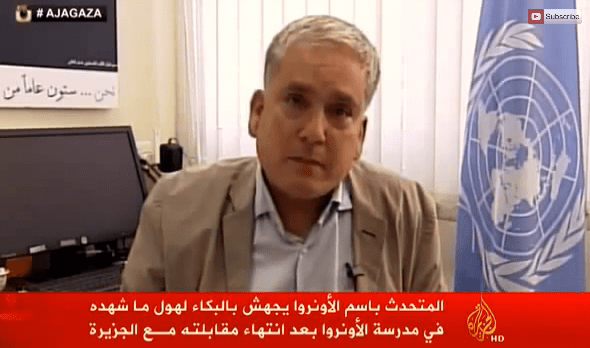
Every week the Truthdig editorial staff selects a Truthdigger of the Week, a group or person worthy of recognition for speaking truth to power, breaking the story or blowing the whistle. It is not a lifetime achievement award. Rather, we’re looking for newsmakers whose actions in a given week are worth celebrating.“Oh, the humanity! And all the passengers screaming around here! … It’s… I can’t talk, ladies and gentlemen. Honest… I’m sorry. Honest, I can hardly breathe. I’m going to step inside where I cannot see it. … I’m going to have to stop for a minute, because I’ve lost my voice… This is the worst thing I’ve ever witnessed.”
—Journalist Herbert Morrison on witnessing the explosion of the Hindenburg airship, May 6, 1937
Informative though it can be, even the best of traditional reporting omits parts of the human experience that are essential to comprehending the fullness of events.
Almost one month has passed since Israel, led by Prime Minister Benjamin Netanyahu, began a bloody military campaign against Hamas, the militant Islamic organization that governs the Gaza Strip. That operation, executed by what one instructor in the Israel Defense Forces described to her students as “the most moral army in the world,” killed over 1,400 Palestinians by the start of August and wounded more than 9,000. The vast majority of both the injured and dead were civilians.
A number of Palestinian civilians have been killed when Israeli bombs hit shelters operated by the U.N. refugee and relief organization, UNRWA. According to the U.N., more than 240,000 Palestinians now stay in such shelters in Gaza while another 200,000 have been displaced and are staying with neighbors or other families. At least 20 Palestinians who sought shelter — many of them children who were sleeping — were added to the casualties when what a preliminary investigation determined was an Israeli bomb hit a U.N. facility Wednesday. Numerous families had fled to the shelter after receiving warnings from the Israeli military that their homes would be hit. It was the sixth time a U.N. shelter had been struck in the latest offensive. The organization said it had given the Israeli military the coordinates of the shelter 17 times.
The Guardian called UNRWA spokesman and former BBC reporter Chris Gunness’ reaction to the tragedy, a spontaneous eruption of tears at the end of a live interview Wednesday with Al-Jazeera Arabic, one of the “many memorable images of the war.” Indeed, the spokesman’s breakdown is an example of one sort of vital information that traditional journalism rarely delivers to its audience, a vicarious experience of the visceral anguish that can overcome humane witnesses of terrible events.
Gunness told The Guardian of the event, “It was a live interview, and I just about got through it, just about held it together. … But what really makes my heart burst is the suffering of children, and I was so moved by the appalling attack on the school in Jabaliya that I couldn’t control myself any longer. … For me, it was a moment of private grief. I had no idea it had been broadcast until friends started calling and texting me.”
“My tears pale into insignificance compared to those of the people in Gaza, who are suffering intolerably,” he added. “We have now reached a point of such profound tragedy that tears are more eloquent than words.” And finally, “if my tears focus attention on the wholesale denial of human dignity in Gaza, then I have no regrets.”
After the interview, on Thursday’s “Democracy Now!” Gunness spoke angrily of the displacement of Palestinians, the deaths of his colleagues in the offensive and the shift in his organization’s focus from the quiet provision of relief to finger-pointing activism.
“We saw huge displacement in Gaza,” he told host Amy Goodman. “There are now, in UNRWA facilities, 86 of them, nearly a quarter of a million people. And don’t forget, these are people displaced because of the Israeli ground offensive, and according to international law, it’s the belligerent parties in a conflict which are responsible for the humanitarian consequences, particularly towards civilians. So, UNRWA has reached a great breaking point. And we are at the point where eight of our staff have been killed. Our facilities are overwhelmed. Because of the continued displacement and the fact that Israel has dropped leaflets, etc., from the sky and sent text messages, possibly thousands, tens of thousands, hundreds of thousands more are going to be displaced. We may soon find ourselves where there are tens of thousands of people in the streets of Gaza—no food, no water, no shelter, no safety, frankly, after we’ve found that Israeli artillery is capable of hitting our safe shelters.
“And we’re saying enough is enough,” he continued. “We cannot be expected to have an endless capacity to absorb the consequences of Israeli military decisions, and it is time that we acknowledge that we’ve moved beyond the realm of humanitarian action alone, and we have moved into the realm of political accountability and political action. … It’s up to others, with the political weight, to bring correct influence to bear on the parties. And we all know exactly which parties and which influences have to be brought to bear. It’s time for them to do so, to end this conflict, because the guns need to fall silent. Enough blood has been spilled. And that moment of cease-fire, of permanent cease-fire, will not come soon enough for the embattled people of Gaza — and, by the way, for the 6 million civilians in Israel who have been terrorized by these appalling barrages of rockets that have been flying out.”
In addition to his aggressive compassion, Gunness is responsible in the language he uses to describe what he witnesses. When Goodman asked how the U.N. confirmed it was Israel that “attacked” the shelter, rather then move straight to the evidence, he reoriented the question. “The word “attack” is not a word that we’ve used,” he said, “because that implies deliberate intentionality, and that’s not something we’re saying. We’re saying that an Israeli artillery shell struck the school, and there’s a big difference there.” This kind of precise description is always called for, but it’s especially necessary in a conflict loaded with serious consequences for all responsible parties should matters eventually be settled in courts. And that’s what Gunness and his colleagues want. “Let’s have a proper investigation,” he added to Goodman. “There must be accountability. There must be transparency and proper reporting. The truth will come out. And, you know, we hope that with truth, as is often the case, will come justice.”
Gunness has held his Jerusalem-based job at the UNRWA for more than eight years. In that time he saw three wars in Gaza and campaigned to draw media attention to the siege of Yarmouk, a Palestinian refugee camp on the outskirts of Damascus whose inhabitants are trapped in the Syrian civil war, The Guardian reported. After the three week campaign in Gaza in 2008 and 2009, he wrote and performed a play, “I Am A Warehouse,” about a storage facility that was repeatedly shelled. For his commitment to truth in reporting and the well-being of Palestinian refugees, whom he has called “truly the dispossessed of the earth,” we honor Chris Gunness as our Truthdigger of the Week.
Kaya Bouma:
Your support matters…Independent journalism is under threat and overshadowed by heavily funded mainstream media.
You can help level the playing field. Become a member.
Your tax-deductible contribution keeps us digging beneath the headlines to give you thought-provoking, investigative reporting and analysis that unearths what's really happening- without compromise.
Give today to support our courageous, independent journalists.
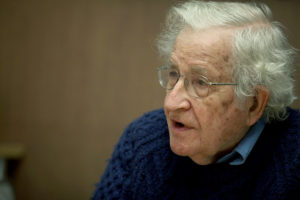
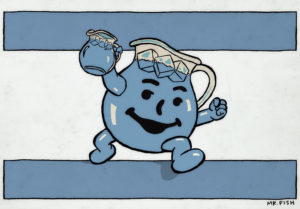

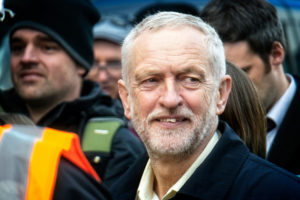

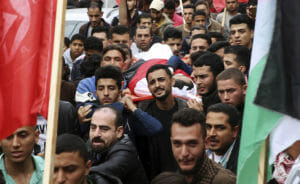
You need to be a supporter to comment.
There are currently no responses to this article.
Be the first to respond.